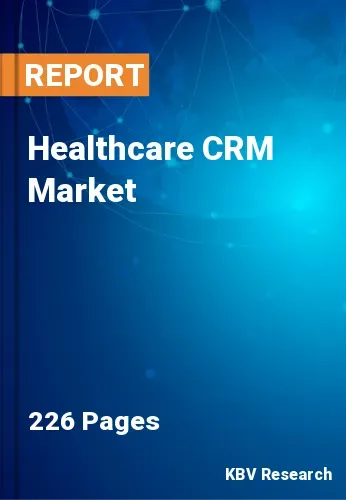The Global Healthcare CRM Market size is expected to reach $25 billion by 2028, rising at a market growth of 8.9% CAGR during the forecast period.
CRM particularly tailored for the healthcare business. Healthcare CRMs integrate many data sources to give an all-encompassing view of patient habits and activities. A healthcare CRM system's main goal is to interact, recruit, and retain patients. The expansion of the healthcare CRM market is anticipated to be driven by an increase in demand from patients for simple access to therapies through virtual patient care and technical advancements in rebuilding healthcare databases.
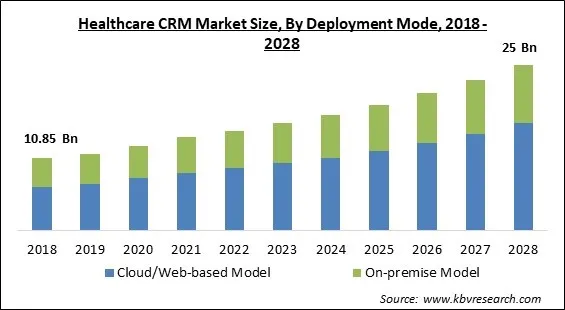
In addition, patients' increasing need for early therapy with home care, digital care, portable surveillance, and illness monitoring devices promotes the expansion of the market for healthcare CRM. There is an increase in the number of chronic conditions, like diabetes and cancer, that require rapid medical support and treatment and are predicted to increase the demand for healthcare goods.
Government partnership with communities of providers, patients, and payers is anticipated to stimulate economic expansion. The usage of direct targeted marketing or social marketing is anticipated to increase throughout the forecast period. Several of the major and reasons for the implementation of these technologies include improved departmental integration, decreased costs, higher patient satisfaction, and multifaceted administrative staff advantages.
A CRM acts as a synchronized database and centralized platform for medical staff and patient communication. When patients visit a clinic, nurses may view all of their data on a single dashboard, allowing them to respond to their needs more quickly. In addition, CRMs provide robust capabilities for automating regular processes including as payments, appointment scheduling, and patient notifications.
The COVID-19 pandemic has offered India with both obstacles and chances for growth. The crisis has unleashed the floodgates for Indian startups, several of which have responded to the occasion and hastened the creation of inexpensive, scalable, and rapid solutions. In addition, the pandemic is stimulating the rise of telemedicine as well as the home healthcare sector in different nations. The pandemic has compelled organizations operating in the healthcare sector to adopt advanced solutions and systems, which would escalate the demand for healthcare CRM in the market.
For the expansion of the healthcare customer relationship management (CRM) industry, the key market participants are embracing new technologies. A healthcare customer relationship management (CRM) platform employs technologies like the internet of things, blockchain, and artificial intelligence. Such technologies boost the software's effectiveness and efficiency. As stated by the National Center for Chronic Condition Prevention and Health Promotion, six out of ten Americans suffer from a chronic disease like stroke, diabetes, heart attack, or cancer.
A CRM in healthcare is also essential for expediting service delivery. To use this approach, a physician may quickly provide potential patients with all pertinent information. For instance, the ability to examine client databases enables the identification of patients with comparable conditions. Due to this, the total process of establishing a diagnosis in the case should become significantly quicker. In addition, the top healthcare CRM allows users to examine historical patient reports. This expedites the diagnostic process.
Professionals are required for the operation and management of healthcare CRM software and platforms. People working on healthcare CRM solutions must be familiar with the most recent software, technologies, and information technology instruments. There is a lack of skilled professionals who are trained for operating the advanced solutions and systems to optimize the healthcare procedures. Along with that, many healthcare organizations are increasingly adopting such solutions, however, their workforce is not fully aware and well-versed with healthcare CRM solutions.
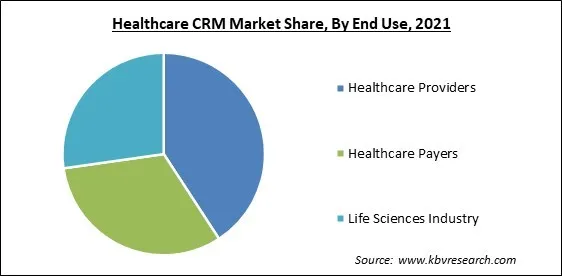
Based on functionality, the healthcare CRM market is segmented into Customer Service and Support, Digital Commerce, Marketing, Sales and Cross -CRM. Customer Service and Support segment recorded a significant revenue share in the healthcare CRM market in 2021. This is due to the existence of multiple CRM systems on the market and market participant actions. Pega for Healthcare & Life Sciences, for example, is a participation, effectiveness, and self-service platform for healthcare payers, providers, pharmacy benefit managers, and life science sector partners.
On the basis of deployment mode, the healthcare CRM market is classified into On-premise and Cloud. Cloud segment garnered the highest revenue share in the healthcare CRM market in 2021. The section consists of solutions that assist manage data hosted by third-party providers on an as-needed basis, including scaling possibilities. Increased acceptance of cloud technology, increased digitization in the healthcare industry, and endeavours by significant corporations are among the primary reasons driving the segment's growth.
By End-use, the healthcare CRM market is fragmented into Healthcare Providers, Healthcare Payers and Life Sciences Industry. Healthcare Providers segment procured the highest revenue share in the healthcare CRM market in 2021. It is due to the rising number of hospitals and clinics across various nations of the world. In addition, many governments are investing in their healthcare sector and thus, establishing advanced healthcare facilities. This would further create opportunities and demand for innovative systems and solutions in the market.
| Report Attribute | Details |
|---|---|
| Market size value in 2021 | USD 14 Billion |
| Market size forecast in 2028 | USD 25 Billion |
| Base Year | 2021 |
| Historical Period | 2018 to 2020 |
| Forecast Period | 2022 to 2028 |
| Revenue Growth Rate | CAGR of 8.9% from 2022 to 2028 |
| Number of Pages | 226 |
| Number of Tables | 363 |
| Report coverage | Market Trends, Revenue Estimation and Forecast, Segmentation Analysis, Regional and Country Breakdown, Competitive Landscape, Companies Strategic Developments, Company Profiling |
| Segments covered | Functionality, Deployment Mode, End Use, Region |
| Country scope | US, Canada, Mexico, Germany, UK, France, Russia, Spain, Italy, China, Japan, India, South Korea, Singapore, Malaysia, Brazil, Argentina, UAE, Saudi Arabia, South Africa, Nigeria |
| Growth Drivers |
|
| Restraints |
|
Region-wise, the healthcare CRM market is analyzed across North America, Europe, Asia Pacific and LAMEA. North America emerged as the leading region with the highest revenue share in the healthcare CRM market in 2021. It is a result of the region's superior network and IT development. Adoption of the Patient Protection and Affordable Care Act (2010) and government efforts like health connect and e-health fuel business growth.
Free Valuable Insights: Global Healthcare CRM Market to reach USD 25 Billion by 2028
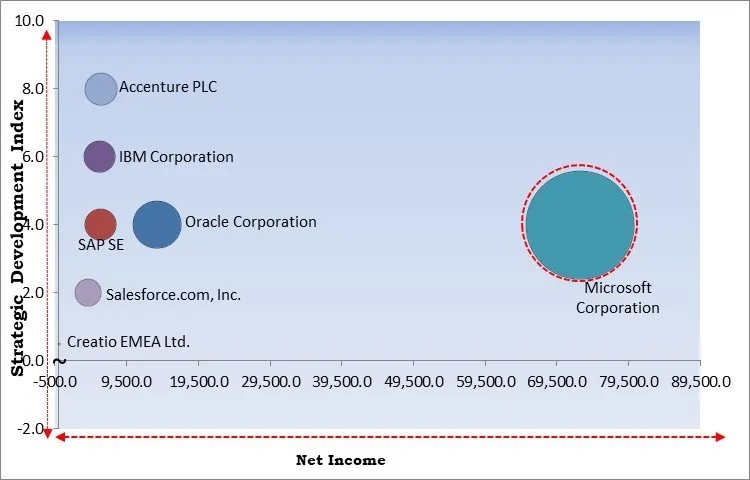
The major strategies followed by the market participants are Acquisitions. Based on the Analysis presented in the Cardinal matrix; Microsoft Corporation is the major forerunners in the Healthcare CRM Market. Companies such as Oracle Corporation, IBM Corporation and Accenture PLC are some of the key innovators in Healthcare CRM Market.
The market research report covers the analysis of key stake holders of the market. Key companies profiled in the report include IBM Corporation, Microsoft Corporation, Oracle Corporation, SAP SE, Accenture PLC, Zoho Corporation Pvt. Ltd., Salesforce.com, Inc., Verint Systems, Inc., Creatio EMEA Ltd., and hc1.com Inc.
By Deployment Mode
By Functionality
By End Use
By Geography
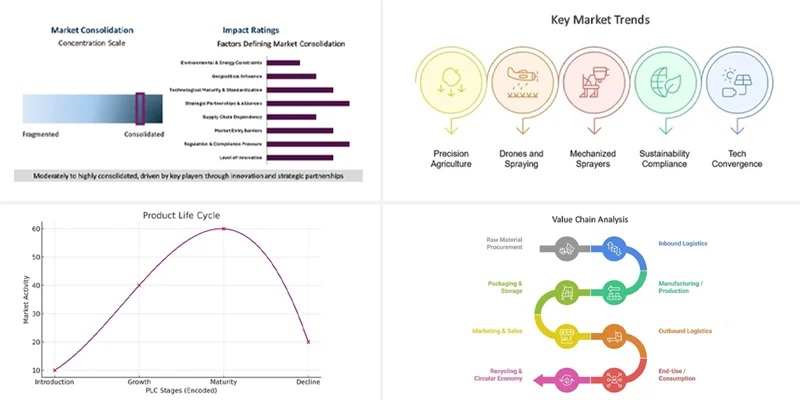

The global Healthcare CRM Market size is expected to reach $25 billion by 2028.
Technological Innovations And Increasing Incidence Of Chronic Conditions are driving the market in coming years, however, Shortage Of Qualified Personnel restraints the growth of the market.
IBM Corporation, Microsoft Corporation, Oracle Corporation, SAP SE, Accenture PLC, Zoho Corporation Pvt. Ltd., Salesforce.com, Inc., Verint Systems, Inc., Creatio EMEA Ltd., and hc1.com Inc.
The expected CAGR of the Healthcare CRM Market is 8.9% from 2022 to 2028.
The Sales segment acquired maximum revenue share in the Global Healthcare CRM Market by Functionality in 2021 thereby, achieving a market value of $9 billion by 2028.
The North America market dominated the Global Healthcare CRM Market by Region in 2021, and would continue to be a dominant market till 2028; thereby, achieving a market value of $10.8 billion by 2028.
Our team of dedicated experts can provide you with attractive expansion opportunities for your business.
